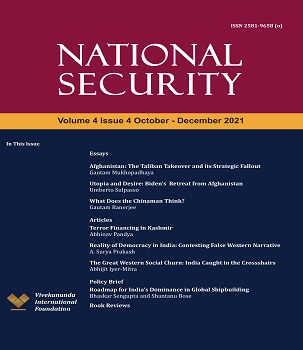About The Issue
This issue of National Security explores critical themes in India’s emerging security environment by some of India’s leading experts. Former Ambassador in Kabul, Gautam Mukhopadhyay in his lead essay discusses the strategic implications of the Taliban takeover of Afghanistan and warns that a period of conflict both within the country and in the wider region is likely. Offering a different perspective, Umberto Sulpasso argues that the rapid US withdrawal from Afghanistan as a necessary strategy-- reminiscent of the Roman empire’s withdrawal from the East-- that frees the US from a war bereft of idealism and therefore unwinnable. Joe Biden can now focus on other urgent domestic and global strategic tasks.
Abhinav Pandya’s study focuses on the financing of terror operations in J&K, while Gautam Banerjee warns that Communist China’s declared objective of capturing large tracts along India’s Northern and Eastern border states poses a serious threat to India. B.M. Suri emphasises that India’s security challenges shall continue to demand development of indigenous high technologies and manufacturing based on them.
A. Surya Prakash and Abhijit Iyer-Mitra undertake fact-based critiques of the Western liberal-left campaign against the Modi government and expose the deep intellectual problems and ideological biases that characterise it. Similarly, Devsena Mishra’s critique of global Big-Tech’s operations points to their roots in the intelligence and defence department’s funding of Silicon Valley Start-ups whose commercial success is based on information gathering, thereby posing a threat to India’s national security.
A highlight of this issue is a major policy brief by two former senior naval officers, Bhaskar Sengupta and Shantanu Bose, that outlines a strategy to build a world class shipbuilding industry in India to advance its vital industrial, commercial, and military aims. Equally noteworthy is a long review essay by Former Deputy National Security Advisor, Ambassador Satish Chandra on the making of the Indus Water Treaty and its implications for India.
CONTENTS: Volume 4 (2021) Issue 4 , (October-2021 to December-2021)
Editor’s Note
The Gathering Storm | Prof. Sujit Dutta
Essays
Afghanistan: The Taliban Takeover and its Strategic Fallout | Gautam Mukhopadhaya
Utopia and Desire: Biden’s Retreat from Afghanistan | Umberto Sulpasso
What Does the Chinaman Think? | Gautam Banerjee
Technology Ecosystem & National Security | B.M. Suri
Articles
Terror Financing in Kashmir | Abhinav Pandya
Abstract: This paper is an analysis of terror financing in Jammu and Kashmir based on the author’s research and fieldwork in the past five years in this sensitive border State. To sustain and fund its proxy war in Kashmir valley, over the last three decades, Pakistan has created a complex, multi-layered and networked terror financing system with distinct characteristics not obtained in the other conflict theatres. The novel features of raising money include illegal funds raised from allocating medical, engineering, and other higher education seats in Pakistan and other countries, Haj tours and travels, LoC cross-border trade, and Jamaat-i-Islami funding networks. Separatist and extremist entities, including the officers and politicians with dubious loyalties and the separatist media, also raise money through local State government sources. Terror funding is utilized for various ends like running terrorist organizations, extremist religious entities, separatist media, stone-pelting, funding Hurriyat and mainstream political parties, and funding social media and intellectual narratives. India’s counter-terror financing efforts received a fillip with the formation of National Investigation Agency (NIA) in 2009. Over the last five years, NIA has launched a massive crackdown on terror funding which has given a significant blow to Pakistan’s three-decade-old investment.
Reality of Democracy in India: Contesting False Western Narrative | A. Surya Prakash
Abstract: India’s constitutional values and democratic traditions have come under severe and concerted attack from various Western institutions, including research organisations, think-tanks, NGOs, and government established commissions, especially since early 2020. Among them are Varieties of Democracy (V-Dem), Reporters Without Borders (RSF), Freedom House, and the United States Commission on International Religious Freedom (USCIRF). After an in-depth analysis of these reports, the question that arises is on what basis have they arrived at such assessments? Are the authors of these reports apprised of the Indian Constitution, and have they done adequate research on its working? Also pertinent are queries such as: have they looked at the elements which are non-negotiable for a country to be categorised as a ‘democracy’, and have these researchers compared the Indian Constitution and its working with the constitutions of other nation-states which they place above India? This article seeks to answer these questions.
The Great Western Social Churn: India Caught in the Crossshairs | Abhijit Iyer-Mitra
Abstract: India is in the crosshairs of literally every liberal publication of the western world. Its democracy is described as eroding and it is generally portrayed as slowly but inexorably moving towards fascism. This is despite the fact that press criticism of the government has never been sharper or more vocal, and that the head of state and head of government come from two historically underprivileged castes - a Dalit and an Other Backward Caste (OBC). This is also despite the fact that this government has done more to protect women’s rights, spent more money on religious minority scholarships and afforded more welfare schemes bringing basic amenities like electricity and toilets to every Indian. While it is easy to see this as a conspiracy, it is much easier explained by sociological and political trends in the West. India needs to understand and counter these socio-political trends rather than simply feel sorry about conspiracies .
Intelligence and Big Tech | Devsena Mishra
Policy Brief
Roadmap for India’s Dominance in Global Shipbuilding | Bhaskar Sengupta and Shantanu Bose
Book Reviews
Indus Basin Uninterrupted | Satish Chandra
Educational Reforms in Saudi Arabia | Hirak J. Das


Post new comment